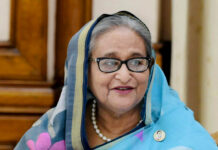
Last Tuesday, the home ministry issued a statement warning social media users from home and abroad against spreading “false, fabricated, confusing and inciting statements about the government, military, police and other law enforcement agencies.” The statement, signed by senior information officer of the ministry, further condemns “spreading false and baseless news about the security forces that is threatening to ruin the peace in the country and spreading fear, concern and confusion among the general public.” The statement ends with the threat that anyone not complying will face legal consequences.
Nothing is told, no information shared and no explanation given as to what triggered such a dire and all-encompassing gagging statement and what are the facts that brought the home ministry to such conclusions. We know from experience that an informed public is the most effective bulwark against rumours, fake news and attempts to disrupt peace, and conversely an uninformed one is most vulnerable to “incitements and confusion.”
The general public and the media have no idea what the home ministry is talking about. What does phrases like “threatening to ruin the peace in the country” mean? What are we to understand from such statements emanating from the home ministry itself that is charged with maintaining internal order and peace? Is the country facing some sort of danger? We need and must know, so that we can defeat those forces of destabilisation.
However, the home ministry’s directives follow several other gagging orders that came before. On April 16, 2020, when media started revealing the unpreparedness of our public health system in handling the spread of Covid-19 and depicting the sufferings of ordinary people, instructions were issued to all nurses working in government establishments not to talk to the media.
Then on April 23, Health Minister Zahid Maleque ordered all health officials, including doctors, not to talk to the media without approval of appropriate authorities.
On May 3, Bangabandhu Sheikh Mujib Medical University—please note that it is a university whose teachers are among the most qualified and whose students are fully capable of holding fact based and scientifically supported views—silenced their staff from talking to the media.
Recently, on October 7, the department of secondary and higher secondary education issued a circular forbidding students and teachers from writing, sharing, “liking” or posting anything that “ruins the image of the government or the state” or “disrespects any important person, institution and profession” on social media. They were also told not to post anything that could create “dissatisfaction among the general public”. The heads of institutions were asked to take action against any teacher or student who violated this directive.
What sort of education are we aiming to impart? Are we planning to produce a generation of problem solving learners or slogan chanting sycophants? When students are prevented from doing anything outside their prescribed syllabus and when the syllabus is itself extremely restrictive, then obviously the students will be prone to rote learning which, we know from experience, produces only paper pushers and not thought expanders. Are they going to take us to a place of pride in the 21st century world?
Take the issue of posting anything on social media that “disrespects any person, institution and profession”. Can’t a student express the view that he or she is unhappy with the what, how and why, and the manner of what is being taught? Will reporting the frequent absence of a teacher amount to showing “disrespect”? If a teacher posts about the corruption in his or her own institution, will that be “disrespecting” an institution? Will reporting the sexual misconduct of a teacher amount to disrespecting the teaching “profession”?
Teachers are supposed to perform the vital task of imparting knowledge. When they are warned against doing anything that affects the “image of the government”, what sort of knowledge will they be imparting?
The issue of concern is that the notice to the department of secondary and higher secondary education was not about quality control but about thought control. For decades, we have written about the quality of education, of the archaic nature of our curriculum and the need to modernise it, of the quality of our textbooks, about the quality of our teachers, the lack of their retraining programmes, the differences between the quality of urban and rural schools, etc; and yet, the note does not address any of these vital issues but focuses on whether anything is being said or done that is critical of the government.
At each level, we are throttling the development of the free mind.
The fundamental question is, where does freedom of thought and expression, guaranteed by our constitution, stand in light of all these directives? Nurses and doctors cannot talk about the health sector, teachers and students cannot talk about education, and the general public cannot talk about the police, other law enforcement agencies and the government. I suppose the question to ask of the government is, what can we talk about?
The biggest harm that these statements by various ministries are doing to the government is sowing a seed of mistrust. It seems that the government does not trust the nurses, doctors, teachers, students and the general public. Doesn’t this amount to the biggest show of no confidence by the government on its own people? Doesn’t it mean that the government assumes that if the people are allowed to speak, they will speak against them? Otherwise, why these restrictions? It must be said that we already live under many restrictive laws, the most prominent and obnoxious being the Digital Security Act. With these new restrictions by different ministries imposed on people under them, the government is further stifling the exercise of freedom of opinion and expression.
Exactly when the people need to be in touch, need to exchange ideas, strengthen each other’s morale through shared experiences and articulate divergent views so that we can devise a way out of the pandemic, point out what’s working and what’s not—newer restrictions are being put on our freedom of expression.
One by one the doors are being shut, the lights are being extinguished, windows are being shuttered and voices are being throttled, leading to an overwhelming sense of fear, anxiety, claustrophobia and frustration.
Mahfuz Anam is Editor and Publisher, The Daily Star.









